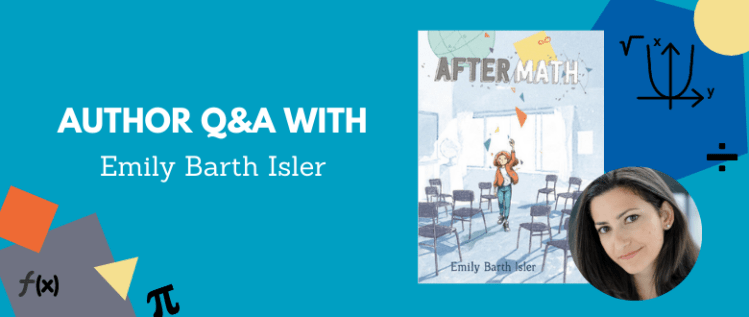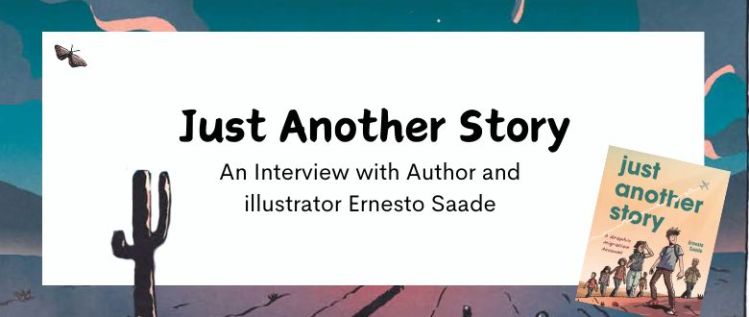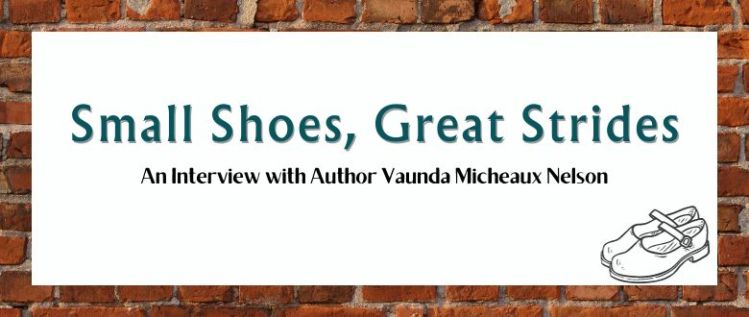AfterMath: An Interview with Emily Barth Isler

In AfterMath, twelve-year-old Lucy is still grieving her little brother, Theo, who recently died from a congenital heart defect. Her parents are so intent on a “fresh start” that she doesn’t know how to talk to them anymore. And the other kids in her grade are survivors of a very different kind of tragedy: a school shooting that devastated their small town four years ago. Without the shared past that both unites and divides her classmates, Lucy feels lost. Even her love of math doesn’t offer the absolute answers she craves. But when an after-school mime class gives her a chance to forge new kinds of connections, Lucy finds that while grief can take many shapes and sadness may feel infinite, love is just as powerful.
Debut author Emily Barth Isler shares her writing journey and the books that inspired her. Read on to find a book trailer, free discussion guide, and so much more!
Book Trailer
Author Interview

What made you want to become a writer?
I think I always wanted to be a writer— my father is a writer and his father, my grandfather, was as well, and in some ways it seemed inevitable to me that I would be a writer, too. But I took a big detour first! I worked as a professional actor from the age of 5 until my late 20s. I loved being a child actor, because it felt like an extension of play, a chance to be creative and work with amazing people. But as an adult, when I moved to New York after college to keep acting, it started to feel more like a job than a fun, creative thing. Of course, I had some great gigs, played fun roles, worked on soap operas, commercials, stage, and TV, but I started getting more interested in the scripts than I was in actually acting in them. Acting started to feel like a habit— I’d been doing it basically my whole life— rather than a choice. I got to the point where I didn’t want to say someone else’s words anymore… I wanted to write my own words!
This is when I knew it was time to return to my true passion, writing. To me, writing felt more personal and more daunting than acting. Sure, acting puts your body and face on display, can make you feel vulnerable in front of a crowd, but writing means bearing a piece of your soul! This felt far more scary to me!! Luckily, I was ready to really embrace it around the time I was pregnant with my first child. I also knew I wanted a more flexible career, where I could decide what and when I wrote, and I started writing my first novel.
Was it easy to become a writer?
Writing that first book wasn’t the easy magic I hoped it would be; I didn’t immediately sell it overnight! In fact, I didn’t sell that first book at all! Being a writer means doing many things, and along the way, I wrote marketing content, sponsored entertainment for web companies, social media content, articles for magazines and websites, blogs, short stories, and even a sitcom! There are a billion ways to be a writer, which is what I love about it! If you’re writing, you’re a writer! You don’t need a crew or a set or fancy materials, you just need a story you want to tell and a way to put it on paper! You don’t even need a reader, at first. Writing is something you can do on your own time— an amazing creative outlet!
I like to think of myself as more of a storyteller. I used to tell stories as an actor; then I translated my storytelling skills to the page. The goal is still the same: I want to make people think, feel things, and experience the world through someone else’s eyes.
What kind of books do you like to write?
I love to write contemporary stories, ones about people who could live right here and now. I write for a huge range of audiences, from picture books meant for babies and their families, to books for adults. I love love-stories of all kids, whether romantic or familial or friendship. I like writing about people and relationships, and I always want to make the audience feel something.
What books did you read as a kid that influenced you?
The Anne of Green Gables series and the Little House on the Prairie books are some of the earliest influences I can remember. My parents would read to us on long car trips and at night before bed, and our whole family would laugh and cry together over all those books.
I read Lois Lowry’s The Giver when it came out in 1993, and it floored me. I read it again and again and again. I think it was one of the first dystopian stories I’d ever experienced, and it blew my mind in the best way— wide open! It offered a world where the parents couldn’t be counted on, where the “grownups” in charge weren’t all operating in everyone’s best interests, and I couldn’t believe a book could make me feel the way The Giver made me feel. It was sad and hopeful and inspiring and terrifying and lovely, all at once. (Bonus points if you noticed I reference it in AfterMath— it’s the book Lucy is reading at lunch the first time she talks to Avery!) I also loved Lois Lowry’s Number the Stars— I was later in a touring production of the play adaptation of it in my early teens! Really, I loved all of Ms. Lowry’s work— the Anastasia books were some of my favorites.
Ann Rinaldi was a big influence on me. She wrote historical fiction, and she always wrote from the most unexpected perspectives. She told stories we all thought we knew, but from the point of view of someone witnessing it in a way we could never have imagined. I loved that, and will always be grateful to Ms. Rinaldi for her work.
I loved to read a good series as a kid— Sleepover Friends and The Saddle Club were two that I particularly adored. I loved following the same, beloved characters across many books. I think that inspired my love of character development, and also television, since a great TV show is a lot like a book series!
Caroline B. Cooney, Phyllis Reynolds Naylor, and Katherine Patterson were some of the other authors I adored in childhood and beyond.
Are any of the characters in the book modeled after people from your real life?
Mr. Jackson is an amalgam of a two great teachers in my life, Terry Sullivan and Eric Ebersole.
Mr. Sullivan was my middle school Gifted and Talented teacher— the first person (outside of my parents) who told me I was a writer and really encouraged me to write. My sixth grade year, he taught an after-school mime class much like the one in AfterMath, and the things I learned in that class are still with me to this day, 30 years later. Mr. Sullivan encouraged me to write a play, and then to enter it into a contest, which I won!
Mr. Ebersole was my calculus teacher for two years in high school. He’s the teacher who, like Mr. Jackson does in the book, did the Zeno’s Paradox demonstration in class to explain infinity— obviously, that had a tremendous impact on me! Mr. Ebersole used to tell us all that there was no such thing as “not being a math-person.” You’d never say, “I’m not really an English Language Arts person” or “I’m not really a reader.” He taught me to find math applications in my every day life, and, when we needed a break from calculus, he’d take out his guitar and sing with us.

What is the most surprising thing you discovered while researching or writing the book?
I really didn’t think that this story had anything to do with me, personally, other than my strong personal belief in gun sense laws, and my fear as a parent for the safety of my kids. But after I was done writing the book, I realized that the way the kids at Lucy’s new school talk frankly and bluntly about their trauma was really similar to the way I dealt with a trauma from my childhood.
I survived a traumatic incident towards the end of high school, when I was seventeen. Beyond the immediate aftermath, I basically compartmentalized the incident, and buried my trauma. A year or so later, when I was away at college, I started dealing with the trauma I had experienced, and, once in therapy and confronting it, I went through a phase of several years when I would tell anyone I met about this traumatic incident. “Hi! Nice to meet you. I’m Emily. Want to hear this crazy, awful thing that happened to me?” Yes, it was a lot. I am sorry to all the people I met in those years, and for all the times I completely inappropriately shared my horrific story in really inopportune moments!
But I am glad I was able to use this experience— however unconsciously!— in the writing of this book. Every character in AfterMath has gone through something traumatic. Every person we meet in life has, likely, been through something as well. One of my goals in writing AfterMath was to inspire the kind of empathy we all should have for every human we encounter. There’s that meme, “Be kind, for everyone you meet is fighting a battle you know nothing about.” (It’s been attributed to at least four or five different people, so I will leave it unattributed). I think this is a wonderful, important way to go through life, and something really valuable for kids to think about. Everyone you meet has a story. Many of those stories have sad or difficult elements. Not everyone will spill their deep, dark secrets to you when they first meet you, like I did in my late teens/early 20s! (Which is probably a really good thing, let’s be honest!). But know that everyone is working through something.
What do you hope readers will learn or discover from reading your book?
Even more importantly than realizing that everyone is fighting a battle is knowing that each one of those people has inherent value, beyond and separate from that trauma. Not every trauma survivor wants to be known by or because of what happened to them. Many don’t want to be defined by their most painful experiences. I wanted kids reading this book to see that there is life beyond trauma. Just because something horrible happens to someone doesn’t mean their life is over, or that the rest of their life has to be defined by this one thing. We are all books. Each event is just a chapter. It’s part of your story, but not the whole thing.
How long did it take you to write the first draft of AfterMath?
I never believed in “the muse” before— never thought that an idea could just come to you, fully formed, but this idea really did come to me, pretty much fully formed! I had two small children when I got the idea, so I wrote the book in five- and ten-minute chunks during naps and snack times. I often say that if I had had forty-eight uninterrupted hours, I think I could’ve written the first draft of this book in a single sitting. But I didn’t, so I wrote it in tiny pieces while taking care of my kids full-time, over the course of three weeks. But it was another five years of drafts and rewriting to become the book it is today. Some things have changed from the first draft— certainly, much has been added, but very little of the basic truths have changed. It has always been about Lucy and her parents, Lucy and Joshua, Lucy and Avery, and, of course, the teacher we all want in our lives, Mr. Jackson.
I owe a debt of gratitude to my brilliant agent, Kari Sutherland, who then took this first draft and asked me the right questions to get to the heart of the story, producing a far more cohesive and compassionate second (and third, and fourth!) draft. Then, the incomparable Amy Fitzgerald, my editor, took the book even further, making the book all that it is with her thoughtfulness and insight.
AfterMath Audiobook
AfterMath is now available as an audiobook narrated by author Emily Barth Isler! Give your audio-readers this beautiful novel for only $6.99.
Teacher Resources
Download this free discussion guide to start a conversation about the tough topics in AfterMath.
In this activity guide you’ll find crosswords, writing prompts and more! Download this free resource and share with your students to encourage comprehension and creativity.
Author Video
Praise and Further Reading for AfterMath
“It’s an honest and surprisingly hopeful story about the way love and joy can return to lives that grief has shaped.”—The Bulletin of the Center for Children’s Books
“This book is a gift to the culture.” —Amy Schumer
“Like Jewell Parker Rhodes’ Ghost Boys, Isler’s novel takes the timely and realistic topic of gun violence and turns it into an engaging story without sensationalizing it.”—Booklist
“[T]his novel comes pretty close to perfect in its fearless and compassionate exploration of the sorrows, struggles, and hard-won maturing of a spunky twelve-year-old as she deals with the aftermath of loss.”—Judith Viorst, author of The Tenth Good Thing about Barney
“AfterMath is gorgeously written, infinitely heart-wrenching, and tragically timely. Lucy’s voice is powerful and distinct. I loved this novel.” —Leslie Margolis, author of Ghosted, We Are Party People, and the Maggie Brooklyn Mysteries
“Showing a keen understanding of loss, Isler’s compassionate debut is written with stark honesty, showcasing various responses to tragedy . . .”—Publishers Weekly
“Isler nose-dives into the perhaps taboo topic of school shootings, yet breathes healing, change, and math into the emotional catharsis.”—School Library Journal
Read Emily Barth Isler’s Soapbox article released in Publishers Weekly here!
Jewish Women’s Archive also ran this article by Emily Barth Isler.
Connect with Emily!
Love hearing from Lerner authors? Find more author interviews here!



Comments